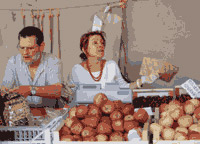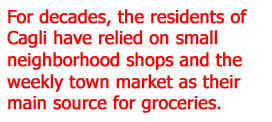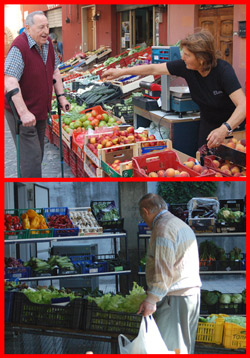Story by Kristen Conroy
 |
Rosella and Bruno |
For 47 years, almost hidden beneath a gloomy roof, Rosella
and Bruno have poured time and labor into their Cagli fruit and vegetable
market. Their hands are worn and smudged with dirt from the latest shipment,
and sweat trickles down Bruno’s face as the sun shines in through
the market’s iron gates. Although appearing to be tired, both find
the energy to set up the wooden cases filled with fuzzy orange peaches,
pale pears, and handpicked, deep red cherries. The merchants know their
customers well and can help them choose the best melons and juiciest apples.
Half a kilometer down the road at the EuroSpin supermarket,
the cashiers are slowly filing in, wearing their blue aprons for another
long work day. The customers line up, waiting for the automatic doors
to slide open. Once the first shopper enters, the rest pile out of their
Volkswagens, Mercedes, and compact cars and head for the oversized grocery
carts. Inside, the aisles are tight and packed high with bulk products.
Customers take a number and wait their turn at the meat and deli department
but can serve themselves from sections devoted to produce, cheese and
dairy, and packaged products.
For decades, the residents of Cagli have relied on small neighborhood
shops and the weekly town market as their main source for groceries. But
now, supermarkets and bulk product stores are invading Cagli, threatening
the mom and pop stores like Rosella and Bruno’s.
 “All
the small stores are shutting down due to these chains like EuroSpin,”
says Rosella. “It is a big crisis as far as I’m concerned
because it is not just fruit and vegetable stands. This is affecting everyone,
including butchers, shoe sellers, cheese and even Sidis (a small, local
grocery store.)” “All
the small stores are shutting down due to these chains like EuroSpin,”
says Rosella. “It is a big crisis as far as I’m concerned
because it is not just fruit and vegetable stands. This is affecting everyone,
including butchers, shoe sellers, cheese and even Sidis (a small, local
grocery store.)”
Though her store has survived, Rosella has seen a marked
decline in her income since EuropSpin came to town in 2000.
Founded in 1994, EuroSpin is the largest Italian discount
food chain. It has more than 600 stores throughout Italy and is expanding
to Slovenia. Each store operates with one or more warehouses to provide
prompt and efficient service for its customers.
 |
| Market Shopping |
And according to Lea, a Cagli resident, EuroSpin’s
strategy is working. “EuroSpin is much cheaper than markets, they
have many brands and a much bigger selection, good quality, and it is
more convenient to buy everything at once.” So convenient that she
shops there twice a week.
Although Italy is perceived as having a strong tradition
of home cooking and near-daily market shopping, one elderly woman says
that is changing. “Nowadays shopping at a EuroSpin is perfectly
normal. No one has the free time for markets anymore.”
EuroSpin offers an assortment of 1,200 products –
more than any small store could stock – and often undercuts the
prices of its local competitors.
“In the beginning EuroSpin was more expensive,
and my stand was cheaper and more popular, “ Rosella says. “Although
I still believe my quality of fruit and vegetables is better, EuroSpin’s
prices are winning.”
As her smile begins to fade, Rosella says sadly,
“My son shows no interest in continuing with my family’s market
and after me, this market stand is done. I see no future for markets in
Cagli and Italy.”
Back at EuroSpin, a young boy and his mother are picking
up a package of juice boxes. “Big, bulk grocery stores are now accepted,”
the woman says. “It is a money and time saver, and the quality is
just as good. This is now Italian tradition.”
Web design by Tami Dixon
Photos by Kathryn Gregory
Video by Melanie Edwards |

